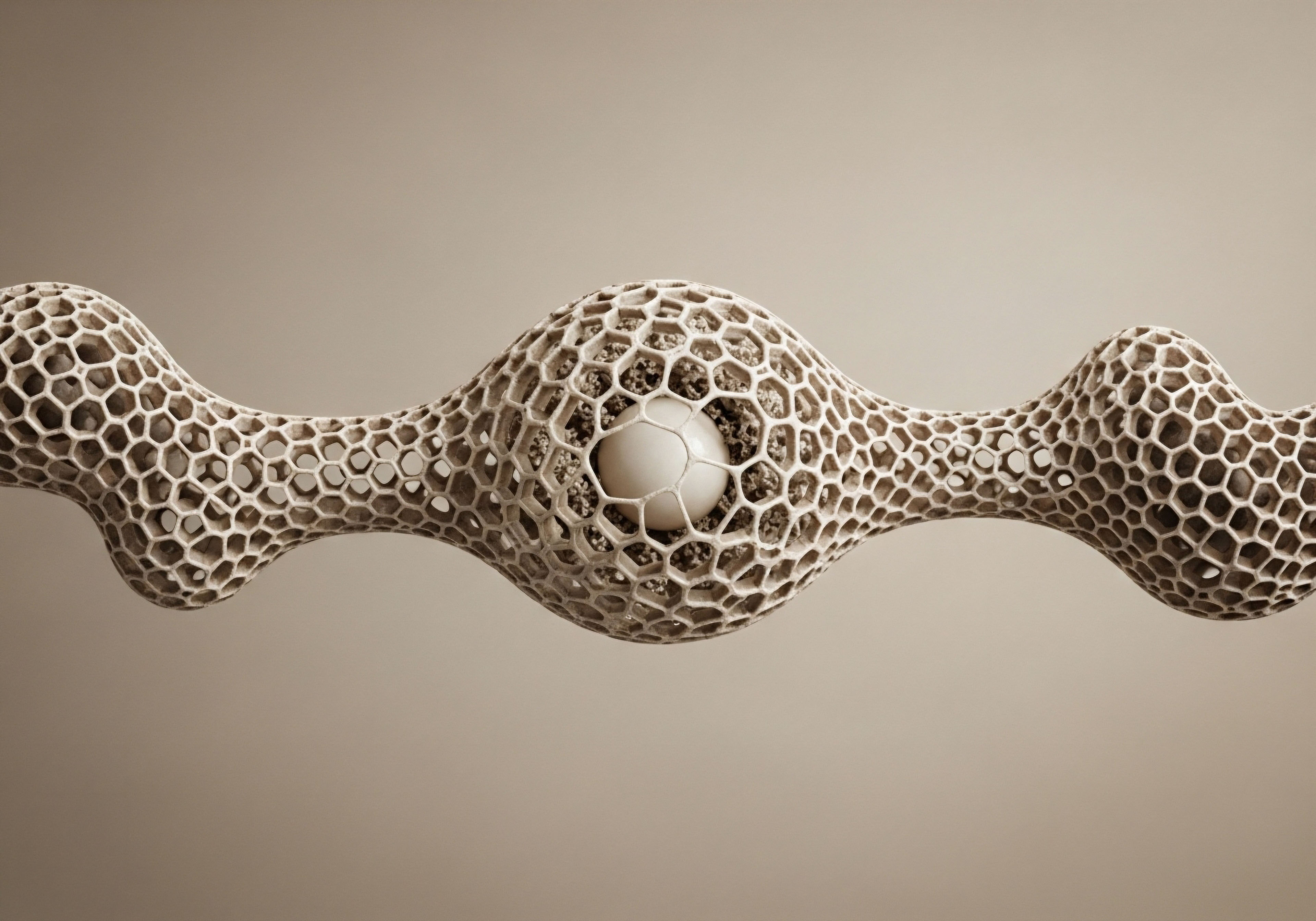

Fundamentals
Have you ever experienced those days when a subtle fatigue settles in, a persistent mental fogginess clouds your thoughts, or perhaps a lingering irritability seems to have no clear origin? These sensations, often dismissed as simply “having an off day” or the unavoidable march of time, can indeed be deeply unsettling.
They hint at a system that is not quite operating at its peak, a biological rhythm slightly out of sync. Many individuals report a diminished capacity for sustained focus, a quiet erosion of their usual vitality, or even a subtle shift in mood that feels uncharacteristic. It is a valid experience, one that speaks to the intricate workings within your own physiology. Understanding these subtle cues is the first step toward reclaiming your full functional capacity.
Your body operates as a sophisticated network, where every system communicates with every other. At the heart of this communication lies the endocrine system, a collection of glands that produce and release chemical messengers known as hormones. These hormones act as the body’s internal messaging service, transmitting vital instructions to cells and organs across the entire biological landscape.
They orchestrate everything from your energy levels and sleep cycles to your mood and reproductive health. When this delicate messaging system encounters interference, the effects can ripple throughout your entire being, manifesting as the very symptoms you might be experiencing.
One of the most fundamental, yet frequently overlooked, elements impacting this intricate hormonal network is your hydration status. Chronic dehydration extends far beyond simply feeling thirsty; it represents a state of persistent fluid deficit that imposes a systemic stress on your body.
This stress demands a continuous compensatory effort from various physiological systems, including those responsible for maintaining hormonal equilibrium. The body, in its wisdom, prioritizes survival, and when water is scarce, it diverts resources to critical functions, sometimes at the expense of optimal endocrine signaling.
Chronic dehydration is a systemic stressor that subtly disrupts the body’s intricate hormonal communication network, impacting overall vitality.
Fluid balance, or homeostasis, is a tightly regulated process essential for every cellular activity. Water serves as the medium for all biochemical reactions, transports nutrients, removes waste, and maintains cellular structure. When the body consistently lacks adequate water, cells struggle to perform their functions efficiently. This struggle initiates a cascade of adaptive responses, particularly within the neuroendocrine system, which is acutely sensitive to changes in fluid volume and electrolyte concentration.

Fluid Balance and Cellular Function
The human body is composed predominantly of water, with this vital fluid distributed across various compartments, including intracellular fluid (inside cells) and extracellular fluid (outside cells, such as plasma and interstitial fluid). Maintaining the precise volume and composition of these fluid compartments is paramount for cellular integrity and function.
A continuous exchange of water and solutes occurs across cell membranes, driven by osmotic gradients. When you are chronically dehydrated, the extracellular fluid becomes more concentrated, drawing water out of cells and causing them to shrink. This cellular dehydration impairs metabolic processes and signaling pathways.
The kidneys play a central role in regulating fluid balance, filtering blood and adjusting water reabsorption based on the body’s needs. This renal regulation is heavily influenced by hormonal signals. When water intake is insufficient, the kidneys work harder to conserve fluid, leading to more concentrated urine. This compensatory mechanism, while vital for survival, places additional strain on the body and can influence the production and release of various hormones.

The Endocrine System’s Command Centers
At the apex of the endocrine system are the hypothalamus and the pituitary gland, often referred to as the body’s central command centers. The hypothalamus, located deep within the brain, acts as a bridge between the nervous system and the endocrine system.
It senses changes in the body’s internal environment, including fluid status, and then signals the pituitary gland. The pituitary, a small gland situated at the base of the brain, then releases hormones that regulate other endocrine glands throughout the body, such as the thyroid, adrenal glands, and gonads.
This hierarchical control ensures that the body can respond dynamically to internal and external stressors. When fluid balance is compromised, these command centers are among the first to register the change, initiating a series of hormonal adjustments designed to mitigate the perceived threat of dehydration. Understanding this foundational interplay between hydration and these central regulatory glands is key to appreciating the broader impact on your hormonal health.


Intermediate
The subtle, persistent strain of chronic dehydration exerts a measurable influence on several critical hormonal axes, extending its reach far beyond simple thirst regulation. This systemic pressure compels the body to prioritize fluid conservation, triggering a cascade of responses that can inadvertently disrupt the delicate balance of other endocrine functions. The body’s adaptive mechanisms, while essential for immediate survival, can lead to long-term imbalances when the stressor of inadequate hydration persists.
A primary axis affected is the Hypothalamic-Pituitary-Adrenal (HPA) axis, often termed the body’s stress response system. When fluid volume decreases, the body perceives this as a physiological stressor. The hypothalamus releases corticotropin-releasing hormone (CRH), which prompts the pituitary to secrete adrenocorticotropic hormone (ACTH).
ACTH then stimulates the adrenal glands to produce cortisol, the primary stress hormone. Chronically elevated cortisol levels, a potential outcome of persistent dehydration, can suppress other hormonal pathways, including those governing reproductive health and thyroid function. This sustained state of heightened alert can diminish overall well-being.
Another key player in fluid regulation is arginine vasopressin (AVP), also known as antidiuretic hormone (ADH). This hormone is synthesized in the hypothalamus and released by the posterior pituitary. Its primary role involves increasing water reabsorption in the kidneys, thereby concentrating urine and conserving body fluid.
Under conditions of dehydration, AVP secretion significantly increases, signaling the kidneys to retain as much water as possible. While beneficial for fluid conservation, sustained high levels of AVP can influence blood pressure regulation and electrolyte balance, creating additional systemic demands.
Chronic dehydration elevates stress hormones and vasopressin, forcing the body into a fluid conservation mode that can disrupt broader endocrine equilibrium.

Hormonal Interplay and Fluid Status
The impact of dehydration extends to the renin-angiotensin-aldosterone system (RAAS), a complex hormonal cascade that regulates blood pressure and fluid balance. When blood volume drops due to dehydration, the kidneys release renin, initiating a sequence that ultimately leads to the production of aldosterone.
Aldosterone, secreted by the adrenal glands, promotes sodium and water retention, further aiding fluid conservation. The continuous activation of RAAS due to chronic dehydration can contribute to electrolyte imbalances and place a burden on cardiovascular health.
Consider the subtle yet significant impact on reproductive hormones. For men, chronic stress, including that induced by dehydration, can suppress the Hypothalamic-Pituitary-Gonadal (HPG) axis. This suppression can lead to reduced production of gonadotropin-releasing hormone (GnRH) from the hypothalamus, subsequently lowering luteinizing hormone (LH) and follicle-stimulating hormone (FSH) from the pituitary.
Lower LH and FSH levels can directly translate to diminished testosterone production in the testes. This can manifest as symptoms such as reduced libido, fatigue, and a decline in muscle mass, mirroring those experienced by men with low testosterone, for whom Testosterone Replacement Therapy (TRT) is often considered.
For women, the HPG axis is equally sensitive. Dehydration-induced stress can disrupt the delicate pulsatile release of GnRH, which is essential for regular menstrual cycles and ovulation. This disruption can lead to irregular periods, anovulation, and symptoms associated with hormonal fluctuations, such as mood changes and hot flashes, particularly relevant for women navigating peri-menopause or post-menopause.
In such cases, understanding the underlying physiological stressors, including hydration, becomes paramount when considering hormonal optimization protocols like low-dose testosterone or progesterone therapy.

Electrolyte Balance and Endocrine Function
Beyond water itself, the balance of electrolytes ∞ minerals like sodium, potassium, and magnesium ∞ is critical for nerve function, muscle contraction, and maintaining cellular fluid balance. Chronic dehydration often accompanies electrolyte imbalances, which can further impair hormonal signaling. For instance, magnesium is a cofactor in hundreds of enzymatic reactions, including those involved in hormone synthesis and receptor sensitivity. A deficiency, exacerbated by dehydration, can hinder the body’s ability to utilize hormones effectively.
The interplay between hydration, electrolytes, and hormonal health is a complex feedback loop. Addressing chronic dehydration involves not only increasing water intake but also ensuring adequate electrolyte replenishment, particularly when considering targeted hormonal support.
Here is a comparison of hydration states and their general impact on key hormones:
| Hydration Status | Hormone Impact | Physiological Effect |
|---|---|---|
| Optimal Hydration | Balanced AVP, Cortisol, Aldosterone | Efficient cellular function, stable mood, optimal energy |
| Mild Dehydration | Slightly elevated AVP, Cortisol, Aldosterone | Increased thirst, mild fatigue, subtle cognitive changes |
| Moderate Dehydration | Significantly elevated AVP, Cortisol, Aldosterone; potential HPG axis suppression | Headaches, irritability, reduced physical performance, potential hormonal disruption |
| Severe Dehydration | Extreme hormonal dysregulation; significant HPG axis suppression | Dizziness, confusion, severe fatigue, profound hormonal imbalance, organ strain |
Understanding these connections allows for a more comprehensive approach to wellness. For individuals exploring hormonal optimization, whether through Testosterone Cypionate injections for men or women, or peptide therapies like Sermorelin for growth hormone support, addressing foundational elements like hydration and electrolyte balance is a prerequisite for maximizing therapeutic outcomes.
Symptoms often associated with chronic dehydration and potential hormonal disruption include:
- Persistent Fatigue ∞ A feeling of being constantly drained, even after adequate rest.
- Brain Fog ∞ Difficulty concentrating, memory lapses, or a general sense of mental sluggishness.
- Irritability or Mood Swings ∞ Unexplained changes in emotional state, often linked to cortisol dysregulation.
- Reduced Libido ∞ A noticeable decrease in sexual desire, potentially related to suppressed gonadal hormones.
- Muscle Weakness or Cramps ∞ Indicative of electrolyte imbalances that impact muscle function.
- Dry Skin and Mucous Membranes ∞ Visible signs of inadequate fluid levels throughout the body.
- Headaches ∞ Often a direct consequence of fluid shifts and electrolyte imbalances.


Academic
The intricate dance between fluid homeostasis and endocrine function represents a sophisticated biological feedback system, where chronic dehydration acts as a persistent perturbation. To truly grasp how chronic dehydration affects hormone production, one must delve into the molecular and cellular underpinnings of osmotic regulation and stress physiology. This exploration reveals not merely a direct impact on specific hormone levels, but a systemic recalibration that prioritizes survival, often at the expense of optimal long-term endocrine signaling and metabolic efficiency.
At the cellular level, chronic dehydration induces a state of hypertonicity in the extracellular fluid, meaning the concentration of solutes outside the cells increases. This osmotic gradient draws water out of cells, leading to cellular shrinkage and dysfunction. Specialized neurons within the hypothalamus, known as osmoreceptors, are exquisitely sensitive to these changes in plasma osmolality.
When osmolality rises, these osmoreceptors stimulate the neurosecretory cells in the supraoptic and paraventricular nuclei of the hypothalamus to synthesize and release arginine vasopressin (AVP) from the posterior pituitary gland. The sustained activation of this pathway under chronic dehydration means a continuous, elevated AVP signal, which, while conserving water, also impacts vascular tone and can influence other neuroendocrine circuits.
The sustained activation of the HPA axis in response to dehydration is a critical area of investigation. Hypovolemia, or reduced blood volume, triggers baroreceptors in the cardiovascular system, sending signals to the brainstem that ultimately activate the paraventricular nucleus of the hypothalamus.
This leads to increased secretion of corticotropin-releasing hormone (CRH), which in turn stimulates the anterior pituitary to release adrenocorticotropic hormone (ACTH). The adrenal cortex then responds by synthesizing and releasing cortisol.
Chronic elevation of cortisol can lead to glucocorticoid resistance at the cellular level, impairing the body’s ability to respond effectively to stress and influencing glucose metabolism, immune function, and inflammatory pathways. This persistent stress response can create a state of metabolic inefficiency, hindering the body’s capacity for repair and regeneration.
Chronic dehydration triggers cellular hypertonicity and sustained HPA axis activation, leading to elevated cortisol and systemic metabolic strain.

Impact on Gonadal and Thyroid Axes
The HPG axis, responsible for reproductive hormone production, is particularly vulnerable to chronic physiological stress, including that imposed by dehydration. Elevated cortisol levels, a hallmark of chronic stress, can directly inhibit the pulsatile release of gonadotropin-releasing hormone (GnRH) from the hypothalamus.
This suppression of GnRH leads to a downstream reduction in luteinizing hormone (LH) and follicle-stimulating hormone (FSH) secretion from the anterior pituitary. Consequently, the gonads ∞ testes in men and ovaries in women ∞ receive diminished stimulatory signals, resulting in reduced synthesis of sex steroids, such as testosterone and estradiol.
This mechanistic pathway explains why men experiencing chronic dehydration might present with symptoms akin to hypogonadism, potentially necessitating protocols involving Testosterone Cypionate or fertility-stimulating agents like Gonadorelin or Enclomiphene. For women, this can manifest as menstrual irregularities, anovulation, or exacerbated menopausal symptoms, underscoring the importance of addressing foundational hydration when considering hormonal balance protocols, including Progesterone or low-dose testosterone.
The thyroid axis also demonstrates sensitivity to chronic dehydration. While not as directly impacted as the HPA or HPG axes, persistent systemic stress and elevated cortisol can influence the peripheral conversion of thyroxine (T4) to the more metabolically active triiodothyronine (T3).
This can lead to a state of relative thyroid hormone resistance or reduced T3 availability at the cellular level, contributing to symptoms of fatigue, weight gain, and cognitive slowing, even with seemingly normal TSH levels. The body’s resource allocation under stress can deprioritize optimal thyroid function, further compounding metabolic challenges.

Metabolic Pathways and Cellular Energetics
Beyond direct hormonal synthesis, chronic dehydration profoundly impacts metabolic function and cellular energetics. Water is the solvent for all metabolic reactions. When cells are dehydrated, enzymatic activity can be impaired, and nutrient transport across cell membranes becomes less efficient. This can lead to a state of cellular energy deficit, even with adequate nutrient intake.
Consider the impact on glucose metabolism. Dehydration can increase blood glucose levels, partly due to increased AVP secretion, which has been shown to influence hepatic glucose production. Additionally, chronic stress and elevated cortisol can induce insulin resistance, meaning cells become less responsive to insulin’s signal to take up glucose from the bloodstream.
This can contribute to dysregulation of blood sugar, a critical component of overall metabolic health. The body’s ability to utilize energy efficiently is compromised, leading to a feeling of persistent low energy and impaired physical performance.
The intricate relationship between hydration and metabolic function can be summarized as follows:
| Metabolic Pathway | Impact of Chronic Dehydration | Consequence for Hormonal Health |
|---|---|---|
| Glucose Metabolism | Increased blood glucose, insulin resistance | Impaired insulin signaling, increased cortisol demand |
| Cellular Respiration | Reduced enzymatic efficiency, impaired ATP production | Lower energy availability, systemic fatigue, reduced anabolic drive |
| Nutrient Transport | Less efficient uptake of vitamins, minerals, amino acids | Suboptimal substrate for hormone synthesis and receptor function |
| Detoxification Pathways | Strained liver and kidney function, reduced waste elimination | Accumulation of metabolic byproducts, increased inflammatory burden |
The implications for personalized wellness protocols are clear. Before embarking on advanced therapies such as Growth Hormone Peptide Therapy with agents like Sermorelin or Ipamorelin / CJC-1295, or specialized peptides like PT-141 for sexual health, a thorough assessment and optimization of foundational elements like hydration and electrolyte balance are essential. These basic physiological requirements form the bedrock upon which more sophisticated interventions can yield their most beneficial effects, allowing the body to truly recalibrate and reclaim its innate functional capacity.

Does Dehydration Affect Growth Hormone Production?
The production and pulsatile release of growth hormone (GH) are influenced by a complex interplay of neuroendocrine factors, and chronic dehydration can indirectly impact this axis. GH secretion is stimulated by growth hormone-releasing hormone (GHRH) from the hypothalamus and inhibited by somatostatin.
Dehydration, by increasing systemic stress and cortisol levels, can create an environment less conducive to optimal GH secretion. Cortisol has a known inhibitory effect on GH release. Additionally, the metabolic strain induced by dehydration can reduce the body’s overall anabolic drive, which is closely linked to GH function.
While not a direct, primary regulator, chronic fluid deficit can contribute to a suboptimal environment for endogenous GH production, making the consideration of GH-stimulating peptides like MK-677 or Tesamorelin even more relevant for individuals seeking to optimize body composition, recovery, and cellular repair.

References
- Guyton, Arthur C. and John E. Hall. Textbook of Medical Physiology. 13th ed. Elsevier, 2016.
- Boron, Walter F. and Emile L. Boulpaep. Medical Physiology. 3rd ed. Elsevier, 2017.
- Ganong, William F. Review of Medical Physiology. 26th ed. McGraw-Hill Education, 2019.
- Chrousos, George P. “Stress and Disorders of the Stress System.” Nature Reviews Endocrinology, vol. 5, no. 7, 2009, pp. 374-381.
- Popkin, Barry M. Kristen E. D’Anci, and Irwin H. Rosenberg. “Water, Hydration, and Health.” Nutrition Reviews, vol. 68, no. 8, 2010, pp. 439-458.
- Armstrong, Lawrence E. “Hydration Assessment Techniques.” Nutrition Reviews, vol. 63, no. 6, 2005, pp. S40-S54.
- Cheuvront, Samuel N. and Robert W. Kenefick. “Dehydration ∞ Physiology, Assessment, and Management.” Comprehensive Physiology, vol. 4, no. 1, 2014, pp. 257-285.
- Miller, J. M. and A. G. Moses. “Clinical Disorders of ADH Secretion.” British Medical Bulletin, vol. 64, 2002, pp. 185-196.
- Pardridge, William M. “Peptide Drug Delivery to the Brain.” Annual Review of Pharmacology and Toxicology, vol. 42, 2002, pp. 295-316.
- Veldhuis, Johannes D. et al. “Growth Hormone Secretion in Humans ∞ Pulsatility, Secretagogues, and Physiological Regulation.” Journal of Clinical Endocrinology & Metabolism, vol. 84, no. 10, 1999, pp. 3431-3438.

Reflection
Having explored the intricate connections between chronic dehydration and your body’s hormonal landscape, you now possess a deeper understanding of how seemingly simple factors can exert profound systemic effects. This knowledge is not merely academic; it serves as a powerful lens through which to view your own experiences. The subtle shifts in energy, mood, or cognitive clarity you may have felt are not isolated incidents; they are often signals from a system striving for balance.
Consider this information as a foundational step in your personal health journey. Recognizing the biological ‘why’ behind your symptoms is the beginning of reclaiming your vitality. Your body is a remarkably adaptive system, and providing it with the fundamental resources it requires, such as consistent, adequate hydration, creates a more resilient internal environment. This understanding empowers you to make informed choices, moving beyond symptom management to address root causes.
The path to optimal wellness is highly individualized. While the principles of hydration and hormonal health are universal, their specific manifestations and the most effective strategies for recalibration will vary for each person.
This exploration encourages a proactive stance, inviting you to listen more closely to your body’s signals and to consider how foundational elements contribute to your overall endocrine and metabolic function. Your journey toward reclaiming full function and vitality is a continuous process of learning and thoughtful self-care.



